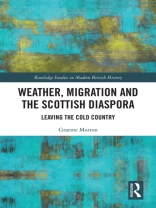Why did large numbers of Scots leave a temperate climate to live permanently in parts of the world where greater temperature extreme was the norm? The long nineteenth century was a period consistently cooler than now, and Scotland remains the coldest of the British nations. Nineteenth-century meteorologists turned to environmental determinism to explain the persistence of agricultural shortage and to identify the atmospheric conditions that exacerbated the incidence of death and disease in the towns. In these cases, the logic of emigration and the benefits of an alternative climate were compelling. Emigration agents portrayed their favoured climate in order to pull migrants in their direction. The climate reasons, pressures and incentives that resulted in the movement of people have been neither straightforward nor uniform. There are known structural features that contextualize the migration experience, chief among them being economic and demographic factors. By building on the work of historical climatologists, and the availability of long-run climate data, for the first time the emigration history of Scotland is examined through the lens of the nation’s climate. In significant per capita numbers, the Scots left the cold country behind; yet the ‘homeland’ remained an unbreakable connection for the diaspora.
Graeme Morton
Weather, Migration and the Scottish Diaspora [PDF ebook]
Leaving the Cold Country
Weather, Migration and the Scottish Diaspora [PDF ebook]
Leaving the Cold Country
यह ईबुक खरीदें और 1 और मुफ़्त पाएं!
भाषा अंग्रेज़ी ● स्वरूप PDF ● पेज 294 ● ISBN 9781000203752 ● प्रकाशक Taylor and Francis ● प्रकाशित 2020 ● डाउनलोड करने योग्य 3 बार ● मुद्रा EUR ● आईडी 7580173 ● कॉपी सुरक्षा Adobe DRM
एक DRM सक्षम ईबुक रीडर की आवश्यकता है












